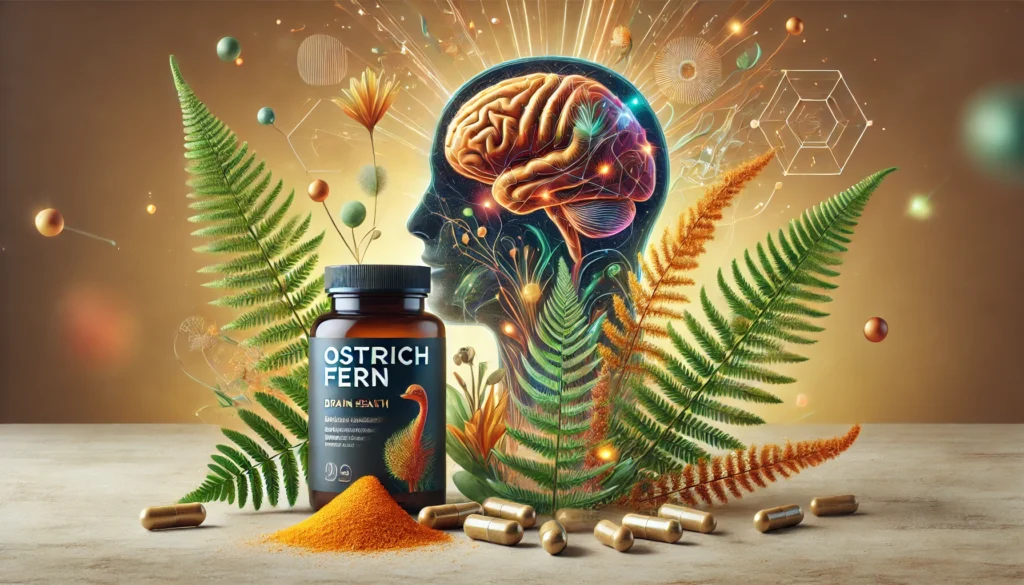Ostrich fern (Matteuccia struthiopteris), known for its elegant, feathery fronds, is a plant native to North America and parts of Europe. Traditionally, ostrich fern has been valued for its culinary uses, particularly its young, coiled fronds, known as fiddleheads. In recent years, however, the plant has gained attention in alternative medicine and nootropic circles for its potential cognitive-enhancing properties. Nootropics, often referred to as “smart drugs,” are compounds that may improve mental performance, including memory, focus, and overall brain function. As an emerging supplement, ostrich fern is being explored for its nootropic benefits, including its potential to enhance cognitive function, improve mood, and provide neuroprotective effects.
This article delves into the scientific mechanisms behind ostrich fern, its potential nootropic benefits, proper dosing, side effects, possible interactions with other supplements and drugs, and the safety considerations necessary for its use.
You May Also Like:
Sources of Ostrich Fern
Ostrich fern is found in temperate regions across North America and parts of Europe, often growing in rich, moist woodlands and shaded areas. Historically, it has been used for its edible fiddleheads, which are rich in nutrients such as vitamins A and C, as well as dietary fiber. However, it is the roots and rhizomes of the ostrich fern that are often studied for their medicinal properties, particularly in herbal medicine and nootropic supplementation.
In traditional medicine, ostrich fern has been employed for its purported ability to improve circulation, support liver health, and reduce inflammation. While there is limited scientific evidence specifically focused on the nootropic properties of ostrich fern, the active compounds found within the plant’s rhizomes may play a key role in its potential cognitive benefits.
Enhance Focus and Cognitive Performance with Panax Ginseng Supplements—Buy Now on Amazon!

Chemistry of Ostrich Fern
The nootropic effects of ostrich fern may be attributed to a variety of phytochemicals present in the plant, including flavonoids, alkaloids, and phenolic compounds. Flavonoids, in particular, are known for their antioxidant and anti-inflammatory properties, which are vital for reducing oxidative stress in the brain—a common contributor to cognitive decline.
One of the active compounds in ostrich fern is Matteucin, a flavonoid that, like others in its class, shows potential for modulating neurotransmitter function and supporting cognitive performance. Matteucin, along with other compounds found in the plant, may help to regulate the synthesis and release of neurotransmitters such as serotonin, dopamine, and acetylcholine. These neurotransmitters play key roles in mood regulation, memory, and overall cognitive function. While further research is required to confirm these effects, the chemistry of ostrich fern suggests potential for supporting cognitive health.
Additionally, ostrich fern is believed to possess mild adaptogenic properties, which means it may help the body respond to stress by enhancing the body’s resilience to mental fatigue and improving overall cognitive performance. These adaptogenic effects could complement the plant’s more direct nootropic properties by providing long-term cognitive support under stressful conditions.
Physiological Mechanisms of Ostrich Fern in the Body and Brain
The mechanisms through which ostrich fern may act as a nootropic are not fully understood, and research in this area is still in its early stages. However, based on its chemical composition and preliminary studies, several potential mechanisms have been suggested:
- Antioxidant Activity: The flavonoids and other phenolic compounds in ostrich fern have antioxidant properties that can help protect brain cells from oxidative damage. Oxidative stress is a significant factor in neurodegenerative diseases such as Alzheimer’s and Parkinson’s, and it can also impair normal cognitive function. By reducing oxidative damage, ostrich fern may help support brain health and potentially slow the progression of cognitive decline.
- Neurotransmitter Modulation: As mentioned earlier, compounds like matteucin in ostrich fern may influence the synthesis and release of important neurotransmitters. Neurotransmitters such as serotonin and dopamine are involved in regulating mood, attention, and cognition. By enhancing the levels and function of these chemicals in the brain, ostrich fern could potentially improve cognitive function, focus, and overall mental clarity.
- Anti-inflammatory Effects: Chronic inflammation has been linked to a range of cognitive disorders, including depression and neurodegenerative diseases. Some studies suggest that ostrich fern may help reduce inflammation, particularly in the brain, thereby supporting cognitive health and enhancing brain function over time.
- Neuroprotection and Cognitive Enhancement: Adaptogenic effects may enable ostrich fern to improve the brain’s resilience to stress. This could result in better cognitive performance, particularly under conditions of mental fatigue or high-stress environments. Additionally, by supporting overall brain function, ostrich fern could improve memory, concentration, and mood.

Nootropic Benefits of Ostrich Fern
Ostrich fern’s potential nootropic benefits have yet to be thoroughly studied in large-scale human trials, but based on its chemical composition and effects observed in animal models and traditional use, it may offer several cognitive benefits:
- Memory Enhancement: Preliminary research into the effects of ostrich fern suggests it may have memory-boosting potential. By increasing the availability of important neurotransmitters, such as acetylcholine (which is involved in learning and memory), ostrich fern may enhance cognitive function, particularly in areas related to memory retention and recall.
- Improved Focus and Mental Clarity: The neurochemical effects of ostrich fern may also contribute to improved focus and mental clarity. Its potential to modulate neurotransmitter function could lead to heightened concentration and better decision-making abilities, which are particularly beneficial in cognitively demanding situations.
- Mood Enhancement: The adaptogenic properties of ostrich fern could help regulate mood by balancing neurotransmitter levels, reducing anxiety, and promoting a sense of calm and well-being. This could lead to improved overall mental health and contribute to better cognitive performance by reducing stress-related cognitive impairment.
- Neuroprotection: The antioxidant and anti-inflammatory properties of ostrich fern may help protect the brain from damage caused by free radicals and inflammation, thus promoting long-term brain health. Neuroprotection is particularly important for aging individuals or those at risk of neurodegenerative conditions, such as Alzheimer’s disease.

Dosage and Supplementation Guidelines
Ostrich fern is typically available in supplement form, often as an extract from the plant’s rhizomes. As a nootropic supplement, the appropriate dosage may vary depending on the individual and the concentration of the active compounds in the supplement. Since there is limited clinical research on ostrich fern specifically as a nootropic, it is important to approach supplementation with caution.
- General Dosage: A typical starting dose of ostrich fern extract ranges from 200 to 500 mg per day. It is advisable to start with a lower dose and gradually increase it as needed, based on individual tolerance. Always consult with a healthcare professional before starting any new supplement regimen, especially if it is being used for cognitive enhancement.
- Standardized Extracts: Many ostrich fern supplements are standardized to contain a specific concentration of active compounds. In this case, follow the manufacturer’s recommended dosage guidelines to ensure safe and effective use. It is also essential to choose supplements from reputable sources to ensure quality and purity.
- Long-Term Use: As with any supplement, it is important to monitor the effects of ostrich fern over time. If cognitive enhancement is the goal, it may be beneficial to take breaks from supplementation periodically to avoid building tolerance or relying too heavily on the supplement.
Side Effects and Safety
Ostrich fern is generally considered safe when used in moderation. However, as with any supplement, there are potential risks and side effects to consider:
- Gastrointestinal Discomfort: Some individuals may experience digestive discomfort, including nausea or mild gastrointestinal upset, especially when taking high doses of ostrich fern. It is recommended to take the supplement with food to minimize these effects.
- Allergic Reactions: Though rare, allergic reactions to ostrich fern could occur. Symptoms may include rash, itching, or swelling. If any of these symptoms occur, discontinue use and consult a healthcare provider.
- Pregnancy and Breastfeeding: There is insufficient data on the safety of ostrich fern during pregnancy or breastfeeding. It is recommended that pregnant or breastfeeding women avoid using this supplement unless advised by a healthcare professional.
Discover the Benefits of Rhodiola Rosea for Brain Health and Stress Relief—Buy Now on Amazon!

Interactions with Other Supplements and Medications
As a natural supplement, ostrich fern may interact with other medications or supplements, especially those with similar physiological effects. Some potential interactions to be aware of include:
- Antidepressants and Antianxiety Medications: Since ostrich fern may have mood-enhancing properties, it could interact with medications that affect neurotransmitter levels, such as selective serotonin reuptake inhibitors (SSRIs) or benzodiazepines. Combining these substances could lead to excessive serotonin levels, increasing the risk of serotonin syndrome, a potentially life-threatening condition.
- Blood Pressure Medications: The anti-inflammatory effects of ostrich fern could have a mild impact on blood pressure. Individuals taking antihypertensive medications should consult their healthcare provider to ensure that ostrich fern supplementation does not interfere with blood pressure regulation.
- Other Nootropics: When combined with other nootropic supplements, such as caffeine or racetams, ostrich fern may enhance cognitive performance. However, caution should be exercised to avoid overstimulation or side effects from the combined effects of multiple nootropic substances.
Risks for Individuals with Certain Health Conditions
Certain health conditions may necessitate caution when using ostrich fern:
- Liver Disorders: Since ostrich fern is metabolized in the liver, individuals with liver conditions should consult a healthcare provider before starting supplementation.
- Kidney Issues: Those with kidney problems should also seek medical advice before taking ostrich fern, as any supplement that affects renal function could worsen existing conditions.
Conclusion
Ostrich fern holds potential as a nootropic supplement due to its antioxidant, anti-inflammatory, and neurotransmitter-modulating properties. Although research on its cognitive-enhancing effects is still in its early stages, preliminary evidence suggests that ostrich fern may help improve memory, focus, mood, and overall brain health. Its adaptogenic properties may also offer additional mental resilience during stressful situations.
However, its use should be approached cautiously, with attention to potential side effects and interactions with other medications. As always, it is crucial to consult a healthcare provider before starting any new supplement regimen to ensure safety and effectiveness. While ostrich fern shows promise, further research is needed to fully understand its long-term benefits and risks.

References:
- Matteuccia struthiopteris (L.) Todaro (fiddlehead fern): an updated review. Retrieved from: https://bnrc.springeropen.com/articles/10.1186/s42269-022-00822-z
- Nutritional and Antioxidant Potential of Fiddleheads from European Ferns. Retrieved from: https://pmc.ncbi.nlm.nih.gov/articles/PMC7923283/
- Comparison of Flavonoid Content, Antioxidant Potential, Acetylcholinesterase Inhibition Activity and Volatile Components Based on HS-SPME-GC-MS of Different Parts from Matteuccia struthiopteris (L.) Todaro. Retrieved from: https://pmc.ncbi.nlm.nih.gov/articles/PMC10934419/
Important Note: The information contained in this article is for general informational purposes only, and should not be construed as health or medical advice, nor is it intended to diagnose, prevent, treat, or cure any disease or health condition. Before embarking on any diet, fitness regimen, or program of nutritional supplementation, it is advisable to consult your healthcare professional in order to determine its safety and probable efficacy in terms of your individual state of health.
Regarding Nutritional Supplements Or Other Non-Prescription Health Products: If any nutritional supplements or other non-prescription health products are mentioned in the foregoing article, any claims or statements made about them have not been evaluated by the U.S. Food and Drug Administration, and such nutritional supplements or other health products are not intended to diagnose, treat, cure, or prevent any disease.
TAGS
ostrich fern, nootropic benefits, cognitive enhancement, mood regulation, neuroprotection, antioxidant, anti-inflammatory, mood support, adaptogen, improved focus


